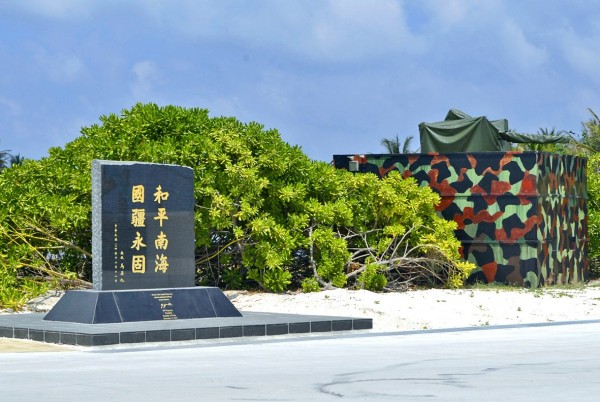《TAIPEI TIMES 焦點》 Taiwanese group enters South China Sea legal fray

A memorial plaque signed by Taiwan President Ma Ying-jeou, which is engraved with the words, “Peace in the South China Sea and our national territory secure forever”, is seen in Itu Aba, which the Taiwanese call Taiping, South China Sea,Taiwan on March 23, 2016. Photo:Reuters
/ Reuters, TAIPEI AND HONG KONG
A Taiwanese group has intervened in the Philippines’ international court case against China’s claims in the South China Sea, pressing Taipei’s position that Taiwan is entitled to a swath of the disputed waterway as an economic zone.
The unusual submission has come to light just as judges at the Permanent Court of Arbitration in The Hague are poised to rule on the Philippines’ landmark case, brought under the UN Convention on the Law of the Sea (UNCLOS).
The move could delay the judges’ ruling, now expected within two months, and potentially complicates worsening territorial disputes roiling across the vital trade route.
Last month, the judges allowed written evidence from the government-linked Chinese (Taiwan) Society of International Law to be submitted, even though Taiwan is neither a member of the UN nor a signatory to the UNCLOS, legal and diplomatic sources said.
As well as reviewing several hundred pages of evidence from Taiwan, the judges have also sought further information from the Philippines and China, legal sources close to the case say.
Manila is challenging the legality of China’s claims to virtually the entire South China Sea, in part by arguing that no reefs, atolls or islets in the Spratly Islands (Nansha Islands, 南沙群島) can legally be considered an island, and therefore holds no rights to an 200 nautical mile (370km) exclusive economic zone.
Itu Aba Island (Taiping Island, 太平島), controlled by Taiwan, is the biggest feature in the Spratlys and the one some analysts believe has the strongest claim to island status and an economic zone. The Spratlys are also claimed by China, Vietnam and Malaysia, while Brunei claims nearby waters.
Taiwanese officials have bristled at the Philippines’ arguments that Itu Aba is a “rock” that cannot support natural human habitation, and therefore has no claims to either island status or an exclusive economic zone.
Citing various government reports and statements as evidence, the society’s submission to the court states “it is clear that Taiping Island is an island which can sustain human habitation and economic life of its own under ... UNCLOS.”
Reiterating Beijing’s refusal to recognize Manila’s case, the Chinese Ministry of Foreign Affairs said the Philippines was using the case to negate China’s territorial sovereignty.
“Chinese people on both sides of the Taiwan Strait all have a responsibility to jointly protect the ancestral property of the Chinese people,” the ministry said in a faxed reply to reporters.
While the society technically operates as a private body, it has close ties to the Republic of China government, including President Ma Ying-jeou (馬英九), who once headed the institution and remains on its board.
A spokesman for Ma said the submission was not made on behalf of the government, but its findings were consistent with Taipei’s official stance.
While the society’s arguments might aid China’s position, Beijing is likely to be wary of any move by the judges to bolster Taiwan’s standing in the international community, analysts said.
Chinese officials have repeatedly challenged the court’s jurisdiction and the rights of the Philippines to bring the case, refusing to participate.
Beijing has ignored invitations from the court to provide its own submission, but the judges have taken into account Chinese public statements, according to the court’s public statements.
Ian Storey, a senior fellow at the ISEAS Yusof Ishak Institute in Singapore who specializes in Asian security issues, including the South China Sea, said it was significant the judges’ had consented to review Taiwan’s arguments.
“It demonstrates that the judges are striving to be impartial, and that they have been at pains to take into account the views of all the concerned parties, even China, which has refused to participate, and Taiwan, which isn’t a member of the UN,” he said.
While China will not like the court giving Taiwan “international space” on this issue, “Beijing may decide to look the other way,” he said.
新聞來源:TAIPEI TIMES



















